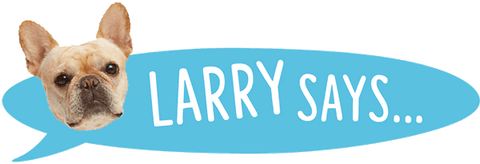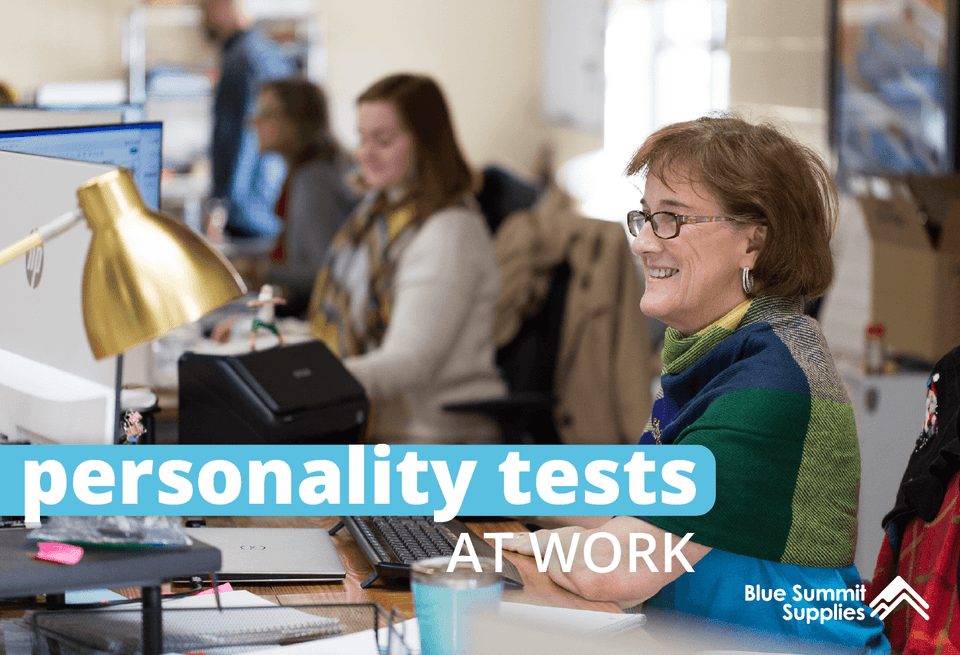The Blue Summit team recently completed the DiSC personality test, and the insights we gleaned were invaluable. We came away with a better understanding of ourselves, our colleagues, the dynamics across departments, and how the team can thrive as a whole. In this article, we’ll dig into the value of work personality tests, why we chose DiSC, and how you can use personality assessments to improve workplace communication.
Team dynamics are incredibly important for small businesses. The happiest, most productive teams work well together because they understand each other’s strengths, weaknesses, and communication styles. An investment in understanding team dynamics is an investment in workplace wellness and productivity.
Below we’ll cover:
- How to Choose a Work Personality Test
- What is the DiSC Personality Test?
- DiSC Work Personality Types
- Workplace Communication
- Other Personality Test Examples
How to Choose a Work Personality Test
Time
It’s tough for any business to take time away from regular tasks, but the rewards that come with a comfortable, communicative, and cohesive team are well worth it.
When deciding between workplace business personality tests, consider the time each of them will require for your team to complete. Calculate all aspects of the process, including explaining the why and how to your team, completing the quiz or questionnaire, and the discussion to follow. Just completing the quiz is not enough. You need to ensure you have time for your team to share their results so that you can start to address the intricacies of your current workplace communication.
Budget
Personality assessments can be costly, especially for small businesses with minimal budgets. Simple, surface-level assessments are available online, but to get a thorough assessment that takes a deep look at your team, you’re going to need to pay.
In recent years, personality testing has turned into a two-billion-dollar industry. Depending on your needs, DiSC assessments can cost anywhere between $24 and $100 per employee personality profile. If this doesn’t fit your budget this year, you may want to consider starting with a different free test or begin with the free version of the DiSC personality test.
Accuracy
When choosing an office personality test, look at what the reviews have to say about accuracy. You want to make sure the test you choose gives your team results they can relate to and work with.
Getting the wrong results or results a person doesn’t relate to will hinder that employee’s experience and decrease the value of the process for the whole team.
Effectiveness
Effectiveness is a little different than accuracy. Consider the value you will get from the personality test. How effective will the process be on improving your office communication? How will it help you understand the dynamics of your team? How well will it help your team address conflicts or struggles you may have experienced in the office?
Look at the reviews for each personality test you’re considering. How reliable is the assessment? How actionable will the results be for your team?

Blue Summit Supplies Chose DiSC
After plenty of research and evaluation, our CEO Owen landed on the DiSC personality test. We set aside some important time as a team to assess ourselves and the ways we communicate inside the office.
We learned a whole lot about ourselves and each other during the process. We now have a better understanding of how to communicate with each other individually and how to communicate across different departments.
💡 Workplace team building can boost morale, increase collaboration, and improve engagement. Learn Why Team Building is Important and How We Do It.
What is the DiSC Personality Test?
The DiSC personality test seeks to help individuals better understand themselves and those around them, enabling greater connection and communication between individuals and teams. By understanding the strengths, weaknesses, and preferences of team members, you can enable positive communication with them, and place them in job roles and environments where they’ll feel comfortable, empowered, and where they’ll be the most productive.
DiSC Workplace Personality Test
Every employee, employer, and co-worker is different. They have different interests, work styles, and each communicates in a different way. How you communicate with one employee may intimidate another, whereas another employee may grow bored or disaffected if the work environment isn’t competitive enough.
Having your team take the DiSC personality test will help you glean key insight into how your team prefers to work and be communicated with. It can also help to mitigate office conflicts. For example, a team member may not realize that they communicate in a way that’s too harsh for someone else, creating a tense work environment. DiSC helps each team member understand how they naturally communicate at work and how others prefer to be interacted with.
A cohesive team is one that understands each other. Work can be divided according to each team member’s specific skill set. Projects can be completed more smoothly, with each employee feeling like a productive and valuable member of the team.
Take this knowledge beyond the inner workings of your team to how your business approaches clients or customers. Consider how a person may want to be communicated with. Your default style of communication won’t be what’s ideal for everyone, and DiSC can provide insight into different methods of communication that could be more fruitful when dealing with prospective clients.

Here’s a little trivia for you. The theory that evolved into DiSC was created by psychologist William Moulton Marston in 1928. William Moulton Marston also helped create the polygraph test, and is the creator of WONDER WOMAN! There was a movie (Professor Marston & the Wonder Women) made in 2017 about Marston and the polyamorous relationship that inspired the creation of Wonder Woman.
DiSC Work Personality Types
The DiSC personality results are broken down into four main types. Every individual will have a score for each type, and, in most cases, each person will have a more dominant personality type.
You are not simply one or the other. You are an amalgamation of each of the four types, with a primary, secondary, and tertiary preference.
Dominance
People who score high in Dominance tend to enjoy challenges and are highly competitive. They prefer to be in authority and are goal-oriented. They like to be appreciated and recognized for their hard work. They are direct, self-sufficient, and usually believe they are held in high esteem by their colleagues. They can be critical of other people, and some may perceive a highly Dominant person as being bossy or domineering.
Influence
People who score high in Influence tend to be extraverted and optimistic. They quickly make friends with those around them and are extremely interested in forming new relationships. These people have a genuine concern for other people’s feelings, and while this means they are often friendly and well-liked, they may not always be direct in their communication for fear of upsetting someone.
Steadiness
People who score high in Steadiness tend to be patient and calm. They carry out repetitive tasks with care and dedication. They like routine. They like to be of assistance and enjoy helping others, particularly those they feel close to. They do the job as directed, and tend not to improvise.
Compliance
People who score high in Compliance tend to be adaptable and diplomatic. They usually avoid risk and prefer to work in a stable, ordered work environment. They like to follow the rules and choose caution over spontaneity.
Personality Test For Workplace Communication
How to Run a Behavioral Personality Test at Work
Schedule a date for running your office personality test well in advance to ensure your entire team is able to attend. Provide each person with adequate information in advance so that they understand why you are taking the time to complete the test and the value it will bring to them, as well as the overall team.
Make sure you give your team enough time to complete the questionnaire and discuss the results. Allow time for a discussion about team dynamics and the role each individual plays on the team.
Do certain departments have more or less of any personality type? What does that mean for the department? What communication experiences has the team had in recent months that either went smoothly or poorly? How can the team work towards better communication within the office?
Make the Most of What You Learned
Ensure you use the insights and takeaways you get from the test. As an owner, office manager, or head of HR, follow up with your team (in private) to hear what they thought of the experience. What did they learn? What did they like about the experience? What would they change next time? Use these insights to adapt the process next year or the next time you run a team building exercise like this.
Circle back a few weeks or months later to remind your team of the insights they gleaned from the experience. Have they been able to implement any of the things they learned about their communication style or that of a co-worker?
Don’t forget about new employees. As your team grows, ensure you include anyone new in the experience. If you can, get them to take the quiz too so that you can add their results into the mix. A couple of new personality types in a small office can really change the dynamic. It’s important to understand how your team is changing as it expands.
Other Personality Test Examples

Myers-Briggs
Myers-Briggs is one of the most popular personality tests available. It was created by Katharine Cook Briggs and her daughter Isabel Briggs Myers based on Carl Jung’s typology. Jung believed that all people perceive the world through four psychological functions: Introversion/Extraversion (I/E), Sensing/Intuition (S/N), Thinking/Feeling (T/F), and Judging/Perceiving (J/P).
Each person has a dominant quality in each category, resulting in 16 different personality types, ranging from ESTJ to INFP.

The Big Five Personality Test
The Big Five Personality Test is generally held in higher esteem than Myers-Briggs in the psychology community. The Big 5 measures five personality factors: Openness, Conscientiousness, Extraversion, Agreeableness, and Neuroticism. The individual is asked to agree or disagree with a series of questions about their preferences and how they typically respond to certain situations. Unlike Myers-Briggs, or DiSC, the Big 5 personality test will not assign you a type on completion—it will just inform you of your preferences.
More From Blue Summit Supplies
💡 The Benefits of Work-Life Balance and How to Maintain it
💡 The Importance of Time Management and How to Optimize Your Time
💡 Enneagrams at Work: Strengths, Weaknesses, and Careers
Do you love office talk as much as we do? Follow our office supplies blog for the latest office trends, team building strategies, product comparisons, and more.
If you have any questions or want to talk to someone about office supplies, send us an email or connect with us on Twitter, Facebook, or Instagram.
 For more informative articles about office supplies, subscribe to our email newsletter!
For more informative articles about office supplies, subscribe to our email newsletter!
Never fear, you won't begin receiving daily sales emails that belong in a spam folder. Instead, we promise a fun weekly roundup of our latest blog posts and great finds from across the web. And if you lose interest, it's always easy to unsubscribe with a single click.










